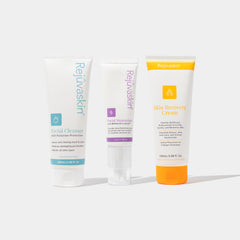You have probably heard that skin is the body’s largest organ. It covers all the important internal systems and acts as a barrier between those internal organs and the rest of the world. Our skin is porous, making it very vulnerable to external factors in the environment like chemicals or contaminants. Yes, the environment affects our skin. Studies in dermatology have shown that the environment is responsible for a large portion of damage to our skin. This can make the task of keeping skin looking healthy and beautiful seem relatively impossible. Here are six surprising ways you may not realize the environment is affecting your skin.
Climate
Severely dry skin is often a byproduct of the climate in which you live. Those inhabiting warm, humid climates receive more moisture to the surface of their skin. On the other hand, those living at high altitudes, where the air is cold, windy, and dry may experience rough, cracking skin. Overexposure to heat can also cause dryness in skin. Avoid extremely hot daily showers, and look for products with moisturizing ingredients in them.
Allergens
Ever experienced puffy, red eyes during a particular season? Do you have to constantly explain “Environmental factors like heat, low humidity, pollen and other airborne allergens can cause skin irritation or a flare-up in dermatitis. Those with allergies to pet dander or pollen can experience symptoms of dermatitis simply from exposure to these elements.
Pollution
Air pollutants can affect the skin’s ability to retain moisture. Dust can clog pores and increase production of bacteria resulting in acne or folliculitis. Other pollutants can cause cell and tissue damage or fluid buildup in the skin. These harmful environmental factors can also lead to bacterial infections, hair loss, or changes in skin’s pigmentation.
Fragrances
Oftentimes ingredients in skincare, laundry, makeup and hair care can irritate the skin. These sensitizing ingredients include dyes, fragrances and parabens. You may write this irritation off as “sensitive skin”, without realizing that removing these ingredients from your daily environment can positively affect the look and feel of your skin by lessening irritation. Additionally, learn to lookout for high-quality products that are transparent about their ingredients.
UV Rays
The sun is the single most influential damage to the integrity of your skin. Over time, the sun damages elastic and collagen in the skin, leaving behind fine lines and wrinkles. For some, this damage occurred early on in your childhood or young adulthood and doesn’t even appear until later in life! Skin cancer is the most common cancer in the U.S. and the EPA estimates that one in five Americans will develop some form of skin cancer in their lifetime. We’re exposed to the sun in more ways than just laying on a beach. You receive UV rays while driving, sitting near a window, fetching the mail and more. Using a daily lotion with SPF can protect your skin from anti-aging caused by the sun’s harmful rays and against skin cancer.
Diet
Your diet has a large impact on the condition of your skin. Foods rich in vitamins D and E, like fish and leafy vegetables nurture skin and protect its elasticity. Omega-3 fatty acids assist in protecting your skin’s healthy textures. Opt for fatty acid-rich foods like salmon for best results, or supplement with a daily dose of Omega-3s in vitamin form. Avoid overly processed, chemical-laden foods, which can irritate skin. Adding antioxidants into your diet can also aid in skin’s protection and beautification.
You can’t necessarily escape all the skin damage caused by the environment, but you can create a skin treatment regimen that alleviates the effects of the environment. Wear sunscreen, eat a balanced diet complete with antioxidant-rich foods, avoid products with fragrances or unnatural chemicals and moisturize dry skin with a protecting lotion. You can’t reverse the damage of the past, but you can take steps to ensure your skin has a bright and healthy future.





















Leave a comment